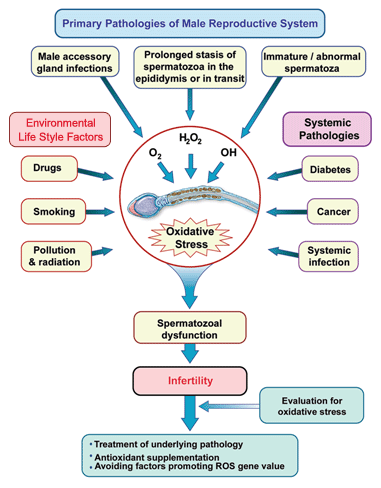Stress and Male Infertility
Oxidative Stress and Male Infertility
Oxidative stress in sperm is induced by REACTIVE OXYGEN SPECIES (ROS). For normal sperm physiology ROS is needed in small quantities but excessive production of ROS might negatively affect the sperm’s fertilizing ability. Decreased levels of seminal antioxidant enzymes and decrease in total antioxidant binding capacity will result in rise of ROS levels in semen. ROS are induced by multiple factors, the figure below gives a detailed overview of all the factors that result in raised ROS and thereby inducing oxidative stress on sperm cells and decreasing the reproductive potential.
Promising research in measurement of ROS through chemiluminescence has made it easy to measure ROS in seminal fluid. ROS measurement in seminal fluid helps the Infertility specialist to predict the prognosis and also helps in choosing the appropriate ART.

Adapted from
International Braz J Urol
Vol. 37 (1): 5-15, January – February, 2011
Management of Oxidative Stress and DFI
- Treating the underlying cause like infections of the genitor-urinary tract, varicocele surgery might help reduce the oxidative stress
- Quitting smoking and alcohol and other addictions might be helpful
- Daily or frequent ejaculation might help in certain subjects
- Therapeutic usage of anti-oxidants like Lycopene, L-Carnitine, Co-Q 10, Selenium, Zinc, Astaxanthine, Vitamin C & E are helpful to combat oxidative stress and raised DFI
Following are the various Anti-oxidant rich foods: β-carotene (carrots, spinach, tomatoes, papaya, guava, cherries, melons, peaches), vitamin C (guava, kiwi, mango, pineapple, melons, strawberries, berries, tomatoes, broccoli, cabbage, oranges, lemons and other citrus fruits), vitamin E (lettuce, peanuts, almonds, coconut, corn, soy or olive oil; wheat and corn germ; cereals), zinc (asparagus, potatoes, vegetables, eggs, fish).




